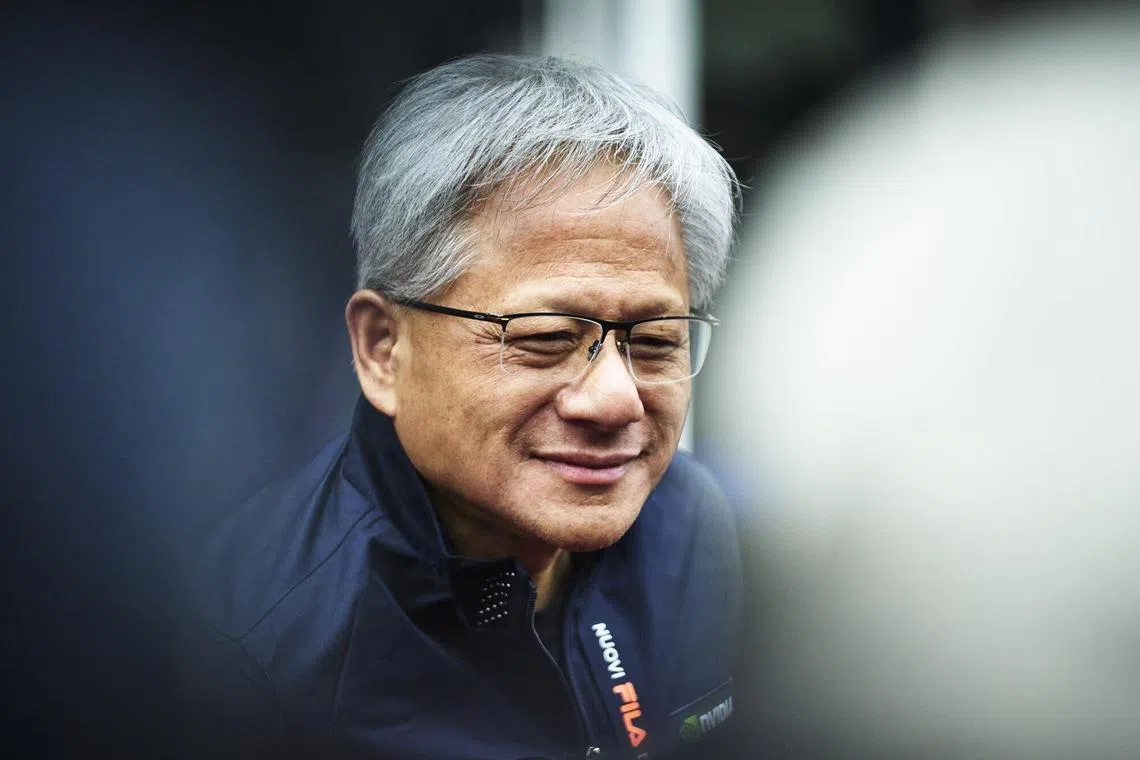World’s richest people led by Nvidia co-founder Jensen Huang lose $145b after DeepSeek sell-off
Sign up now: Get ST's newsletters delivered to your inbox

Nvidia co-founder and CEO Jensen Huang saw his fortune drop US$20.1 billion, a 20 per cent fall.
PHOTO: BLOOMBERG
Follow topic:
NEW YORK – The world’s 500 richest people, led by Nvidia co-founder Jensen Huang, lost a combined US$108 billion (S$145 billion) on Jan 27 as a tech-led sell-off tied to Chinese AI developer DeepSeek
Billionaires whose fortunes are linked to artificial intelligence (AI) were the biggest losers: Mr Huang saw his fortune fall US$20.1 billion, a 20 per cent drop, while Oracle co-founder Larry Ellison’s US$22.6 billion loss was larger in absolute terms, but represented just 12 per cent of his fortune, according to the Bloomberg Billionaires Index.
Dell’s Michael Dell lost US$13 billion, and Binance Holdings co-founder Zhao “CZ” Changpeng shaved US$12.1 billion.
Tech-sector titans as a group saw US$94 billion of wealth evaporate – roughly 85 per cent of the Bloomberg index’s total decline. The Nasdaq Composite Index fell 3.1 per cent, and the S&P 500 dropped 1.5 per cent.
Hangzhou-based DeepSeek has been developing AI models since 2023, but the company first came onto the radar of many Western investors at the weekend as its free DeepSeek R1 chatbot app topped download charts worldwide struggled to keep the app online, suffering outages
DeepSeek’s dark-horse entry into the AI race, which it says cost just US$5.6 million to develop, is a challenge to Silicon Valley’s narrative that massive capital spending is essential to developing the strongest models. That delivered a serious blow to billionaires whose fortunes are tied to the Western AI supply chain that has been the equities market’s biggest driver over the past two years.
Similar playbook
Soaring valuations for so-called AI hyperscalers – including Facebook parent Meta Platforms, Google’s Alphabet and Microsoft – have generated billions in wealth for their owners since OpenAI unveiled ChatGPT in November 2022.
These companies have for the most part operated on a similar playbook: Spend huge sums to develop and run AI systems by hoarding top-of-the-line semiconductors and the energy supplies needed to run them.
Meta chief executive officer Mark Zuckerberg announced on Jan 24 that the company planned to spend US$60 billion to US$65 billion on projects related to AI this year, well above Wall Street estimates. Capital spending across all Big Tech firms is on pace to reach US$200 billion in 2025, according to a Bloomberg Intelligence report.
Despite limited revenue to show for all their investment so far, markets have rewarded US tech stocks with record-high valuations, which have in turn generated historic wealth gains for their owners.
Nvidia has stood out as the AI boom’s biggest single winner so far, with Mr Huang’s net worth increasing almost eight-fold to US$121 billion since the start of 2023 until Jan 24. Mr Zuckerberg’s fortune soared 385 per cent to US$229 billion over the same period and Amazon.com’s Jeff Bezos gained 133 per cent to US$254 billion.
While Mr Huang and Mr Ellison suffered losses, other major tech billionaires’ fortunes escaped unscathed. Mr Zuckerberg’s net worth ended the day up, gaining US$4.3 billion as Meta rebounded from an early-session decline, while Mr Bezos’ wealth climbed by about US$632 million. BLOOMBERG

